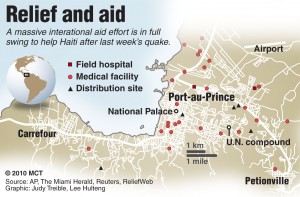
This coming Monday, March 15 all Gustavus students are invited to see a presentation by Dr. Anna Versluis, assistant professor of geography, on the conditions in Haiti organized by the history and latin american, latino, and caribbean Studies (LALACS) department. Dr. Versluis has worked extensively in Haiti conducting research and working with the people.The one-hour presentation will be held in Alumni Hall at 7:00 p.m. and will be free of charge for all attendees.
Two months ago to the day, a catastrophic 7.0 magnitude earthquake struck the small Carribean country of Haiti. Recent reports released by the Haitian government suggest that to date, over 200,000 people have lost their lives and an additional 1 million have lost their homes in the aftermath of the disaster. The figurative aftershocks of this tragedy have been felt across the globe, even here at Gustavus.
“The world is greatly interconnected and crises in one area do have devastating effects throughout the world. Besides the fact that this is a terrible catastrophe that we should continue to have on our minds, we should also be thinking about how we get involved and how we can help,” Associate Professor of History and LALACS, Dr. Sujay Rao said.
Already Gustavus’ resident expert on the country, Versluis has turned her research’s attention to the people affected by the earthquake. From February 28, 2010 to March 7, 2010, Versluis spent time in Haiti conducting personal interviews with over 60 displaced Haitian families living in “tent cities” to assess how neighborly and family aid changed the recovery process for those who lived through the disaster.
“Haiti has many, many people who have long depended on assistance from family and friends to make ends meet,” Versluis said. “Remittances have always played a huge role, a much larger one than all of the international aid that Haiti receives.” Versluis’ study intends to put this type of informal aid in juxtaposition to more “formal” aid that is provided by relief organizations, foreign donors and the Haitian government.
“[The presentation] will be partially on my research, but because I just got back, the data will not yet be analyzed so it will be a more general discussion of my impressions and what I learned from my experiences,” Versluis said.
“While we [at Gustavus] can read newspapers or watch the news to stay updated on Haiti, it is much more valuable to hear from someone who has had direct contact with the people there,” Dr. Paschal Kyoore, professor of French and LALACS said.
Versluis has worked closely with the people of Haiti for more than a decade. When an opportunity presented itself to work in the Haitian capital city of Port-au-Prince, she was initially resistant. “I soon realized that there was much more to Haiti than poverty and violence,” Versluis said. Since that time, she has been back to Haiti on an annual basis to continue her research or for leisure.
As a result of the massive earthquake in January, interest on the subject of Haiti has been on the rise at Gustavus. “This presentation takes advantage of the timely moment to address the issues … These kinds of catastrophes are going to continue to have a great impact on developing countries in the developing world,” Rao said.
This interest has encouraged a number of groups composed of students, faculty and staff to volunteer their time to the Haitian relief effort. “The great deal of concern showed by people at Gustavus demonstrates that [Gusties] are interested in what is happening in international events,” Versluis commented.
As part of a January Interim class entitled “Changing the World,” a group of students raised over $1,200 in donations for Lutheran World Relief.
“I think student-led relief efforts send a very positive message to all students: if you see need in the world, this campus wants to be a part of the response,” First-year Claire Curran, a student in the course, said.
Other relief efforts on campus include an on going toiletry supplies collection by the Center for Vocational Reflection, the same organization that facilitated the January Interim course. A group of professors on campus also raised money through donations to send tents to Haiti for those who lost their homes.
Versluis’ presentation is a few days after this year’s Building Bridges Conference, themed “Surviving the Land of Opportunity,” focused on the issue of immigration in the United States.
Senior Communication Arts/Literature Teaching Major Rebekah Schulz, one of the co-chairs of Building Bridges said, “The mission of Building Bridges is to promote awareness and dialogue about social justice, so the way I think that relates to the relief efforts in Haiti is twofold: one, recognizing our shared humanity and two, also recognizing and looking at the factors that have led up to this situation.”
All students are encouraged to attend the presentation by Versluis on Monday. “We really should appreciate this opportunity,” Rao said. “[Versluis] has been a great addition in expertise.”
“We really should show researchers like Dr. Versluis that we appreciate the work that they do to bring in different perspectives,” Kyoore said.
Versluis also encourages students to consider how they can help Haiti in its time of need. “Take interest in what is happening in the rest of the world and travel to unique places … it will enrich your lives,” Versluis said.
Operation USA is doing a great job over in Haiti. In August, they broke ground on a new school (K-7th), expecting to accommodate 600 or so students. Dr. Versluis was present in Haiti, speaking of the need to rebuild the schools. This one is modern and deserved.
Recent Earthquakes congratulates Operation USA and Dr. Versluis on the work they are doing in Haiti. http://recentearthquakes.net for more info.